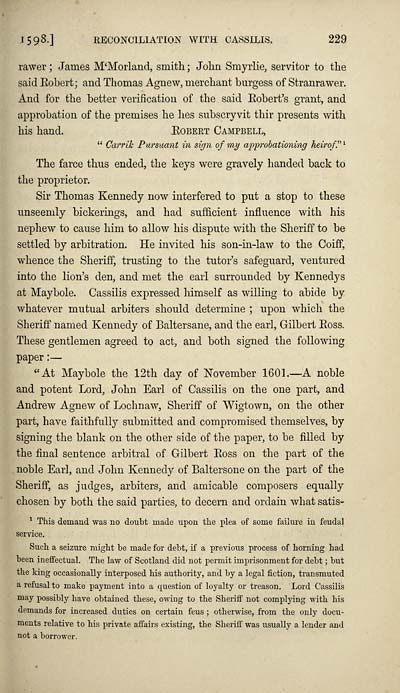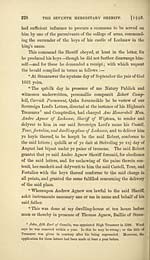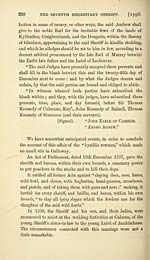Agnews of Lochnaw
(261) Page 229
Download files
Complete book:
Individual page:
Thumbnail gallery: Grid view | List view

1 593.] RECONCILIATION WITH CASSILIS. 229
rawer ; James M'Morland, smith ; John Smyrlie, servitor to the
said Bobert; and Thomas Agnew, merchant burgess of Stranrawer.
And for the better verification of the said Bobert's grant, and
approbation of the premises he hes subscry vit thir presents with
his hand. Eobeet Campbell,
" Carrik Pursuant in sign of my approbationing heirof." 1
The farce thus ended, the keys were gravely handed back to
the proprietor.
Sir Thomas Kennedy now interfered to put a stop to these
unseemly bickerings, and had sufficient influence with his
nephew to cause him to allow his dispute with the Sheriff to be
settled by arbitration. He invited his son-in-law to the Coiff,
whence the Sheriff, trusting to the tutor's safeguard, ventured
into the lion's den, and met the earl surrounded by Kennedys
at Maybole. Cassilis expressed himself as willing to abide by
whatever mutual arbiters should determine ; upon which the
Sheriff named Kennedy of Baltersane, and the earl, Gilbert Boss.
These gentlemen agreed to act, and both signed the following
paper : —
"At Maybole the 12th day of November 1601.— A noble
and potent Lord, John Earl of Cassilis on the one part, and
Andrew Agnew of Lochnaw, Sheriff of Wigtown, on the other
part, have faithfully submitted and compromised themselves, by
signing the blank on the other side of the paper, to be filled by
the final sentence arbitral of Gilbert Boss on the part of the
noble Earl, and John Kennedy of Baltersone on the part of the
Sheriff, as judges, arbiters, and amicable composers equally
chosen by both the said parties, to decern and ordain what satis-
1 This demand was no doubt made upon the plea of some failure in feudal
service.
Such a seizure might be made for debt, if a previous process of horning had
been ineffectual. The law of Scotland did not permit imprisonment for debt ; but
the king occasionally interposed his authority, and by a legal fiction, transmuted
a refusal to make payment into a cmestion of loyalty or treason. Lord Cassilis
may possibly have obtained these, owing to the Sheriff not complying with his
demands for increased duties on certain feus ; otherwise, from the only docu-
ments relative to his private affairs existing, the Sheriff was usually a lender and
not a borrower.
rawer ; James M'Morland, smith ; John Smyrlie, servitor to the
said Bobert; and Thomas Agnew, merchant burgess of Stranrawer.
And for the better verification of the said Bobert's grant, and
approbation of the premises he hes subscry vit thir presents with
his hand. Eobeet Campbell,
" Carrik Pursuant in sign of my approbationing heirof." 1
The farce thus ended, the keys were gravely handed back to
the proprietor.
Sir Thomas Kennedy now interfered to put a stop to these
unseemly bickerings, and had sufficient influence with his
nephew to cause him to allow his dispute with the Sheriff to be
settled by arbitration. He invited his son-in-law to the Coiff,
whence the Sheriff, trusting to the tutor's safeguard, ventured
into the lion's den, and met the earl surrounded by Kennedys
at Maybole. Cassilis expressed himself as willing to abide by
whatever mutual arbiters should determine ; upon which the
Sheriff named Kennedy of Baltersane, and the earl, Gilbert Boss.
These gentlemen agreed to act, and both signed the following
paper : —
"At Maybole the 12th day of November 1601.— A noble
and potent Lord, John Earl of Cassilis on the one part, and
Andrew Agnew of Lochnaw, Sheriff of Wigtown, on the other
part, have faithfully submitted and compromised themselves, by
signing the blank on the other side of the paper, to be filled by
the final sentence arbitral of Gilbert Boss on the part of the
noble Earl, and John Kennedy of Baltersone on the part of the
Sheriff, as judges, arbiters, and amicable composers equally
chosen by both the said parties, to decern and ordain what satis-
1 This demand was no doubt made upon the plea of some failure in feudal
service.
Such a seizure might be made for debt, if a previous process of horning had
been ineffectual. The law of Scotland did not permit imprisonment for debt ; but
the king occasionally interposed his authority, and by a legal fiction, transmuted
a refusal to make payment into a cmestion of loyalty or treason. Lord Cassilis
may possibly have obtained these, owing to the Sheriff not complying with his
demands for increased duties on certain feus ; otherwise, from the only docu-
ments relative to his private affairs existing, the Sheriff was usually a lender and
not a borrower.
Set display mode to:
![]() Universal Viewer |
Universal Viewer | ![]() Mirador |
Large image | Transcription
Mirador |
Large image | Transcription
Images and transcriptions on this page, including medium image downloads, may be used under the Creative Commons Attribution 4.0 International Licence unless otherwise stated. ![]()
| Histories of Scottish families > Agnews of Lochnaw > (261) Page 229 |
|---|
| Permanent URL | https://digital.nls.uk/94901246 |
|---|
| Description | A selection of almost 400 printed items relating to the history of Scottish families, mostly dating from the 19th and early 20th centuries. Includes memoirs, genealogies and clan histories, with a few produced by emigrant families. The earliest family history goes back to AD 916. |
|---|

